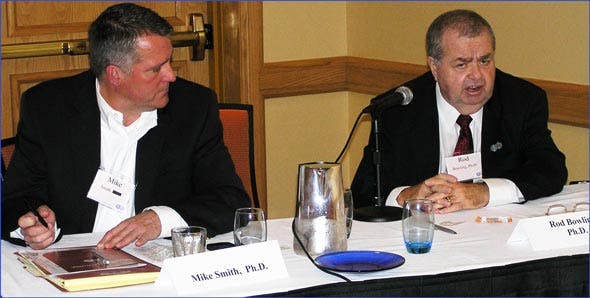Traceability, Sustainability Hot Topics at International Livestock Congress
Published: Jan 12, 2012
USMEF played an active role this week at the 2012 International Livestock Congress, which is held each year in Denver in conjunction with the National Western Stock Show.
Paul Clayton, USMEF senior vice president of technical services, moderated a panel discussion on Tuesday entitled, “Preparing North America for Global Competitiveness.” Panelists included Mike Smith of Harris Ranch and Dr. Rod Bowling of AgriFood Solutions International.
Paul Clayton, USMEF senior vice president of technical services, moderated a panel discussion on Tuesday entitled, “Preparing North America for Global Competitiveness.” Panelists included Mike Smith of Harris Ranch and Dr. Rod Bowling of AgriFood Solutions International.

Smith challenged the U.S. livestock industry to be more openminded on the issue of traceability, an area in which he feels the United States has fallen behind its competitors.
“I think we are going to rue the day when we chose to fight with one another instead of making a decision to have a traceability system,” Smith said. “I find it ironic that those who are champions of country-of-origin labeling are the same people who are so adamantly opposed to animal I.D. and traceability systems. I would argue that you really can’t have one without the other.”
Smith also expressed concerns about the ability to attract young people into livestock production, noting that it is increasingly difficult to find college graduates who have a farm or ranch background or hands-on production experience. He views this as an ongoing challenge for U.S. agriculture as it strives to remain ahead of its competitors.
Dr. Bowling focused on the issue of available water, which he views as “the new oil” because of the impact a water shortage could have on American agriculture and the nation’s economy. He said progress is being made with regard to water conservation, but the meat and livestock industries still have far to go.
“We’ve already had packing plants in the Texas Panhandle that kill 5,000 head per day that have been told by cities, ‘We’re not sure we can sustain you from a water standpoint.’ They really want the jobs, but they don’t have the water,” Bowling explained. “Right now we pay about $3.36 per thousand gallons for water. If that were to go up five or six-fold in the future, it would be a significant burden.”
Dr. Nelson Huerta, director of techincal services for USMEF-Mexico, moderated a roundtable discussion on Latin America's role in global beef production. Panelists Clint Peck of the Montana Beef Quality Assurance Program and Dr. Joao Vendramini of the University of Florida presented their experiences in South America and the production challenges faced in Brazil, Argentina, Uruguay and Paraguay.
USMEF Secretary-Treasurer Leann Saunders, president of IMI Global, serves on the board of directors of the International Livestock Congress and served as master of ceremonies for Tuesday’s student and alumni recognition luncheon. Dr. Dennis Stiffler of Mountain States Rosen, who represents the lamb producing and feeding sector on the USMEF Executive Committee, served as a panelist for a session entitled, “How Do We Define Sustainability?”

On Monday, USMEF hosted the International Stockmen’s Educational Foundation (ISEF) Student Travel Fellowship winners for an overview of global beef, pork and lamb trade. The group included students from across the United States, as well as Argentina, Australia, Brazil, Canada, China and Ethiopia. USMEF-Mexico also sponsored three young beef industry leaders from Mexico to attend the International Livestock Congress.
“It’s very important to educate our top agricultural students about the global marketplace and the importance of international trade,” Clayton said. “The ISEF fellowship program and the additional USMEF sponsorships offer a wonderful opportunity to do that. I was very impressed with the students’ level of interest in international trade and in the programs USMEF is conducting in key export markets.”
